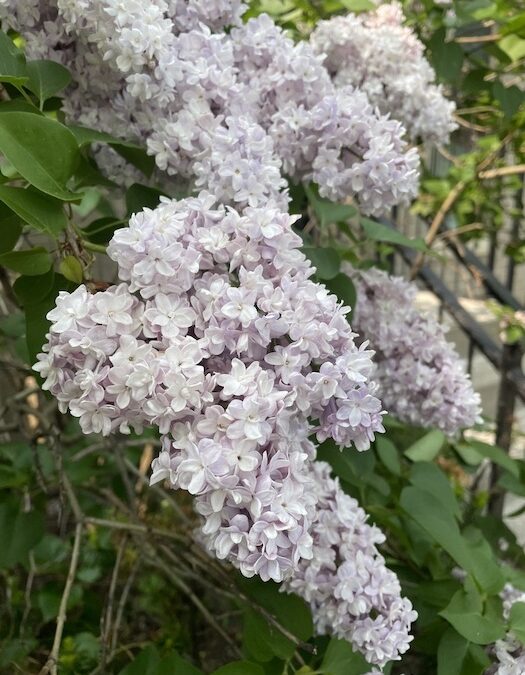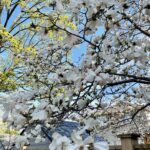Welcome, dear reader, from our beautiful lilac bushes! Today we’ll talk about a very important word: gratitude. It’s one of the foundational stones upon which a lot of spirituality and the virtures are based upon. Just like we talked about presence and simplicity as being the ones that hold all virtues within themselves, gratitude is another one of those hands that hold all, and become the portal that opens our heart into deepening, and expands our spirit. I’ll go through a discussion on the topic, and at the end I’ll share some ways and habits on how to incorporate the practice of gratitude in your every day life.
What does gratitude really mean? It’s a buzz word, all over things like social media, loud voices and images about it; and there are also of course merchandise like gratitude journals. But unfortunately, like many other things, words and intangibles, and especially spiritual concepts, we may often lose the essence, so let’s spend some time today first to think about this and unveil the meaning of gratitude. It is a practice we often find at the root of monastic lives, whether Christian or Buddhist, and it is what spiritual people of all paths of life are often rooted in as practice.
For those of you who have followed my work for awhile, you already know my deep respect for monasticism. Being born in Bulgaria in Eastern Europe, we have many Christian Orthodox monasteries, which I’ve always loved to visit and there is so much to learn from monks for their deep wisdom is something very applicable for our every day life and relationships; and if you’ve read my work, teachings and publications, you know how much love and respect I have for the teachings of Zen Buddhist monk Thich Nhat Hanh. In both Christian and Buddhist monalistic lives, gratitude is one of their main practices.
One of the things that Thich Nhat Hanh often spoke of was how similar both Buddhism and Christianity actually are; they both share in their essence the understanding that to learn to love and to be of service are our most important purpose in this life. Compassion, gentleness, grace, generosity, the ability to share of ourselves, take care of one another, and tend to one another whether by sharing meals, words or togetherness in the garden, are what a spiritual life consist of. And gratitude is what holds these practices – and not just through the mindset or the inner self, but also through our hands, and how we embody it through our every day lips, hands and gestures.
Our world is so separated, within and without, and this is I believe the root of many problems. If we wait for unity to happen externally, we may wait a long time. But if we truly desire unity, and to foster unity, I believe it begins with us, it begins with hands. It begins with reachings our hands across the lines that separate us, and then we sit, listen and learn, hopefully dissolving the boundaries.
Living a genuinely spiritual life is about embodying love and all of its forms through our every day actions and movements; not just when someone is watching, but because it’s the right thing to do.
Gratitude asks of us a certain kind of endurance.
It takes patience, especially with ourselves. And it is an intentional habit, a muscle that we train over time across the twists and turns of our life’s paths; it is refined, like art, over time, allowing us and enabling us to begin to truly see things, people, places, and circumstances properly. Gratitude isn’t about coping mechanism, escapism nor naivity, but it is rather about keeping our perspective clear and fresh, seeing the reality of it, the wholeness of it, and keeping our goals and intentions all the more focused, pure and attainable. Monks know that gratitude is the foundation to a meaningful and happy life.
Initially gratitude may sound like something unnatural and even unsetting. Why would we be grateful for something that wasn’t as we thought it should be? Why should we be grateful for pouring love and time and energy into something, while then facing ingratitude? Why should we be kind and generous while not being treated fairly? Why should we be grateful for someone being unfair to us? Is gratitude just a sugar pill? Or perhaps a trick – hindering us, or hindering our progress or making us complacent?
These questions are natural. These doubts too are natural. And/but while natural, they may often be because we have a bit of a cloud of fear around our vision and perspective.
Gratitude is what essentially clears our vision to see the wholeness of it, rather than only through specific lenses.
To understand anything in life we often need to understand the “opposite”, and in this way, to understand gratitude, we must understand entitlement.
At the core of entitlement is the tendency to forget what we have while emphasizing what we don’t have. As such, it shifts the pole of balance towards the imbalance – towards the negative perspective. This then becomes a negative mindset and a cloudiness of seeing. It may then become a habit of underestimating what we take, while overestimating what we give. This then becomes an imbalance in the energy exchange, and eventually, it drains us, it closes our heart, depletes our spirit and energy, and it limits both our abundance and spiritual growth. This is why generosity is what opens our heart, attracts more abundance and wealth, and is one of the most important spiritual practices – and it also is what makes people live a purposeful life, a meaningful life, feel more purpose and love more deeply.
When someone asks me what is their purpose – surely I can go over your natal chart, I can show you the ways through which it may show and expressed through you on your unique pathway of your life; but still, there is only one main purpose for all people, always, and it is: to learn to love, to love and be of service. When we learn to love, our heart opens, and we are more generous and our intention becomes to be of contribution to other people. So generosity isn’t merely a thing to do, it is a reflection of the wellness of our heart and spirit. Gratitude is the path to that – because it centers us into the present moment, and clears our vision about the reality of a situation.
And what is the reality? Well, the reality is that there is always something to be thankful for – because all is an experience serving to deepen you in understanding.
Entitlement focuses on our expectations and feelings of being “more than”. But this essentially comes from fear or deeper sense of lack. We think we should get something in the way we want it because internally we believe we don’t have enough or that we are not enough i.e. we need to be given more according to us. “You owe me” is a very easy trap to get into which will lead into poverty of spirit, and then physically and emotional also.
At the core of the entitlement is fear and distrust: the fear that if we don’t get what we “deserve”, we won’t get what we need. And this belief aligns to the belief that we world is a malicious survivalist state; and that we do not trust that we’ll get our needs met, because, we may not trust we actually deserve them to be met. Entitlement contracts our energy, in lack and impoverished spirit, while gratitude expands pulling in more abundance on all levels.
Gratitude is a posture of trust. It stands tall, just as much as it kneels to tend to the flowers in the garden. It is humble, for humbleness essentially means being of the earth, being in togetherness; while entitlement is an inner separation that then leads to an outer one reflected in relationships. Gratitude opens within us a vastness of opportunity, wisdom, richness, life.
And like oxygen, gratitude begins to move through our body, through our mind, expanding our vision and perceptions into seeing the wholeness. We don’t get stuck in the little caves, we open inner pathways. We see hope, we see joy, we see the hands that worked in devotion, so that we can have an ordinary spoon to eat with.
And we come into a love much deeper, showing us that one of the most important spiritual truths in life is the understanding that each person does the best they can each day with what they can and have the capacity for. Yes, a loved one may piss you off today – but consider that perhaps they are struggling with someone internally. Consider that perhaps we don’t always know everything about another person, neither about their inner world and what and how they are capable to give at the moment or respond to you. Consider that beyond the role as your parents, they too are only human beings, had their own upbringings, their own hurts, their own paths, and they are doing the best they can. Each person does the best they can with the tools they have.
Gratitude gives us freedom, allowing us to see the beauty surrounding us. Yes, perhaps you are not being given the same love you gave out, nor even a thank you for a service you provided, but consider that that other person just doesn’t know how to be grateful and have inner limits or lack of clarity or inability to express a thank you. Consider that perhaps it is through you, and your generosity and kindness, that they may be able to touch and see how these beautiful qualities look like, sound like; and perhaps someday they will give it forward to someone. Consider that sometimes God speaks through you for another person, and that perhaps you were their prayer when they asked to learn kindness and love, and how it feels to be given.
When we lead with gratitude, we allow the layers of our fears to slowly peel away, pushing us to be fully present, fully ourselves, and fully alive. Gratitude is an attument to our heart. So do not ever close your own heart just because someone else hasn’t shown you that same level of generosity and kindness. Because your heart doesn’t deserve to close itself nor ever be tainted because of others. Your heart of hearts is what you must keep pure always, and protected from being tained from this world.
Ways & habits to incorporate the practice of gratitude into your life:
~ Humility, Acceptance, Presence, Joy ~
I’ve talked in depth about humility, which essentially means to be grounded, be of the earth and nature, and understand the right proportion of things. No one is bigger or smaller. All receives what needs. Focus on what you already have – and see the beauty and richness and opportunity in it. Have some old jeans? Well, why not re-new them! Perhaps paint over them!
When we visit a monastery, often times people may initially think that monks live in spaces of lack or deprivation, but that’s not true – it is merely a way to remove the unnecessary distractions, so that they can tune into the virtues and step into the true essence of gratitude and the present moment. There is no deprivation – it is actually serving as expansion. Monks are incredibly productive because they are extremely self-disciplined and keep their focus on what matters and what is to be done.
This is about essentially nurturing – because nurturing is about the present moment i.e. we tend to what already is. We don’t push seeds into the frozen ground in winter, flowers will not grow, it is not their time yet; we’ll only hurt them, and we’ll frustrate ourselves. So this is about learning the timing of the land, and the in turn, the timing of our life and the seasons we go through i.e. acceptance and patience.
When we are faced with some seeming lack, or obstacle or limit or limitation – this is only an opportunity for an inner expansion of both heart and mind (perception), because as we expand within, the external will inevitably reflect that also through the way we will also experience life itself. So when you face a limit, try to open your perceptions on all the things you may just not be seeing yet, and even if not “in bloom” yet, energy is energy, what you devote to and give will always come back to you in form.
Focus on all the things you may walk by each day without paying attention that they give you what you need. For example, call to a mind a time when you slept on a bed which would hurt your back. Is your bed good now? Do you get good sleep? That’s something to be grateful for.
Write down three things you are grateful for – no matter how small, and no matter if material or not. No need to buy a journal, just take out a piece of paper – and form the thoughts and emotions into words through your hand. Do this for thirty days each morning or evening, without ever repeating the same thing. Perhaps you are thankful for the way you felt today, because a loved one smiled, said a sweet comforting word to you. Perhaps you are thankful that you could go on a walk or exercise in the gym, because ugh remember the time when you had a sore throat or too much work or injury and couldn’t do that?
Look at what is around you, beside you, at the people in your life and the material things also – it is a dream realized of a wish you made in some yesterday. What do you have today whether as emotion, person, thought, mindset, wisdom, knowledge, that you didn’t before? Do you remember when you wished for it? How can you tend to what you already have?
Every time you eat a meal, take a few seconds to consider, thank, and call into your mind what it has taken to eat this: the person who made your meal, their loving hands, their time and attention, and also all that before that came, such as all the people who contributed – the farmers, the truckers, etc.
Each night before bed, put your hand on your heart and say thank you thank you thank you, while calling into your mind all the beauty of your day. Perhaps it was a hope, a joy, a flower, an I love you, the laughter of your loved ones. Truly, thank you thank you thank you.
Consider that when someone does something it isn’t necessarily about you – there are many things we don’t see and we’ll never know, and the humility of this deserves to be treasured. Remember that we all as human beings do the best we can with what tools we have, whether physical, emotional, mental or spiritual.
If you feel stuck in one way of seeing the situation, close your eyes and imagine other sides of it. This will put you in a state of more grace and compassion. And when we have more grace and compassion for other people, this is only a reflection that we hold more grace and compassion about ourselves also – for we can only give what we have the capacity within us; we can only meet another as deeply as we’ve met ourselves. When people wonder about self love, it is actually quite simple: love others, give to yourself, be of service, be in open generous heart, as this means you are loving yourself also.
Express gratitude, say thank you, to someone who has touched your heart in some way or has been helpful to you. Even if the service to received wasn’t what you thought you expected, a service provided is a reason to say thank you. The more comfortable you feel with saying these words, the more soothing your heart receives, the more your spirit rejoices and dances, and the more open your heart space becomes. That’s freedom – the peeling off and letting go of the borders, conditions, fears and judgments that limit us from deeper loving.
Reflect on what love means to you? Is it something you get? Is it something you receive? Is it love only if mutual, or is it love because that’s how you feel regardless of what the other person does or feels? Is it love touched or is it love capable of loving even from a distance? Is it presence, is it the simple perfection of just knowing them? We are blessed in many ways, continuously, we just need to pay attention and notice.
And last, but certainly not least, reflect on why you might expect or need gratitude from others. The truth is that people may only give to you what they have capacity for within themselves, and many people just don’t have rich inner lives nor open hearts. We do good, and kind, because that’s the kind of person we are and choose to be each day. Know your intentions, and remain true to them; do not pay attention to the ingratitude of other people, because at the end of it all, we do good, and kind, because this is the right thing to do, coming from the purity and love of our hearts and spirit.
For personal readings with me, you are welcome to browse through my Offerings.
Cover photograph by me.

For more of my writings, browse through my Art of Love.
If you wish to support me and my work, you may do so by sharing it or donate here. For personal readings with me, you may visit my Offerings.
Your support means so much to me! Thank you wholeheartedly!




